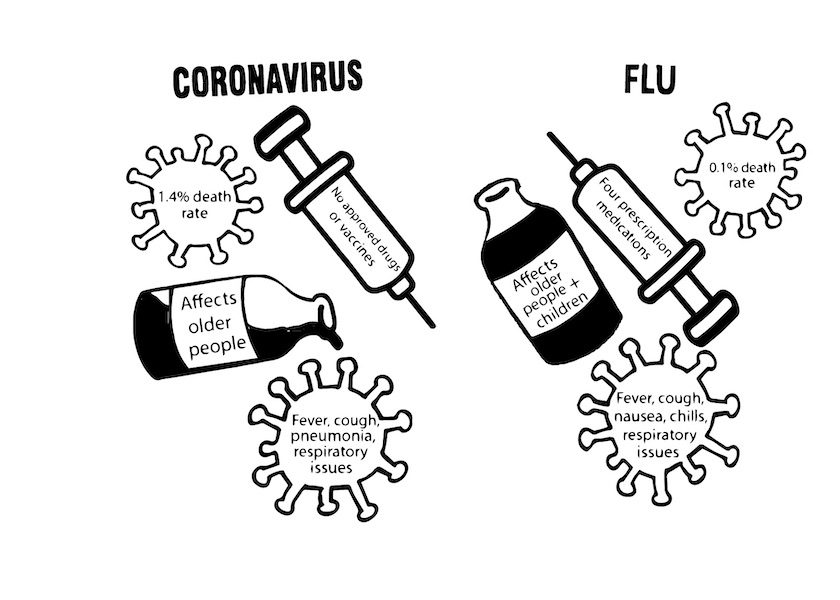New coronavirus causes global, local panic
By Elizabeth Lande, Managing and Copy Editor
Due to the quick-changing information in this article, this news is accurate as of Monday, March 9, 3:00 pm.
 Throughout the month of January, leaking into February, and now continuing into March, national and global news has consisted of largely political buzzwords such as caucuses and primaries, and tragedies, namely Kobe Bryant’s untimely death and the Australian bushfires. However, competing for the top spot on the Google trending page is an issue that encompasses both politics and tragedy: coronavirus.
Throughout the month of January, leaking into February, and now continuing into March, national and global news has consisted of largely political buzzwords such as caucuses and primaries, and tragedies, namely Kobe Bryant’s untimely death and the Australian bushfires. However, competing for the top spot on the Google trending page is an issue that encompasses both politics and tragedy: coronavirus.
The outbreak in question started in Wuhan, China, a city that serves as a transportation and commercial center for the country. Scientists believe that the new coronavirus — coronaviruses are a family of viruses that cause a range of illnesses in humans — called COVID-19, jumped to humans from animals being sold for food in the Wuhan markets. The animals likely contracted the disease from bats, as coronavirus is similar to an illness that infects bat populations.
While the outbreak was brought to global attention in mid-January, infections began earlier, at the end of 2019. They initially went undetected as the effects of the virus can take upwards of 14 days to show themselves. Now, more than one thousand people have died and over 90,000 people are infected in more than 25 countries, including the U.S. Within the U.S., more than 100 cases have been confirmed, and Washington state has rapidly become a point of global attention.
An anonymous man living in Everett became the first U.S. citizen to bring the disease to America. Following a flight from Wuhan, the man was admitted to Providence Hospital on Jan. 20. He remained in an isolation ward for two weeks while medical staff monitored his condition. They also monitored those he had come in close contact with since his return.

The man was released from the hospital on Feb. 3. While his isolation may have been effective, recent weeks have seen new cases explode across the Puget Sound region. Nineteen of the 22 U.S. coronavirus deaths have occurred in the state, with a nursing facility in Kirkland being a center for confirmed cases. Fifty-one of Washington’s over 141 confirmed cases were contracted via some form of contact with the facility, while the majority of remaining confirmation are scattered throughout the Seattle area.
One such confirmation was the case of a high school student in Mill Creek, which prompted the school to close. Around a dozen schools across Washington have followed suit, though not because they have any confirmed cases. Rather, they hope to altogether avoid the risk of spreading a new disease to their students, especially one that lacks a specific medicinal cure. Currently, the best treatment for the virus is rest, isolation, hydration, and support for respiratory issues if it becomes necessary.
The Vashon School District sent out emails on March 3 and 4 outlining the procedure for dealing with the current situation and the scenario for a confirmed within the district. The email urged students to practice personal hygiene with emphasis on washing their hands or using hand sanitizer. In the event that a student or staff member contracted it, the emails said that the district “will immediately be working with Public Health Seattle King County to determine if VISD will close.” The high school Japan trip has been cancelled, and other school sponsored trips are under review.
Health officials have encouraged such precautions, but also stress that coronavirus does not equal a uniform death sentence. The disease tends to infect and prove fatal to older people who already have respiratory issues. While other people can still contract the disease, they are significantly less likely to succumb to it. Several people in the U.S. have tested positive for it but have already recovered.
While its impacts are indeed serious, COVID-19 is still a small risk for U.S. residents. Influenza is a much higher national risk — in 2017 80,000 people died of the flu in the U.S.
For those still concerned about the risk of infection, school nurse Sarah Day gave standard advice on how to keep healthy and avoid illness in general, as well as a caution to the dangers of false information.
“Wash your hands really carefully, not just putting them under the water with soap on it and washing it right off but actually singing … “Happy Birthday” [twice] … and scrubbing your hands really well,” Day said. “Please be careful about your [informational] resources. … Look to the CDC, look to public health.”
Day also added a word of caution and sensitivity.
“Please be very careful about trying to imply that this is any kind of issue related to being Chinese or Asian,” she said.
